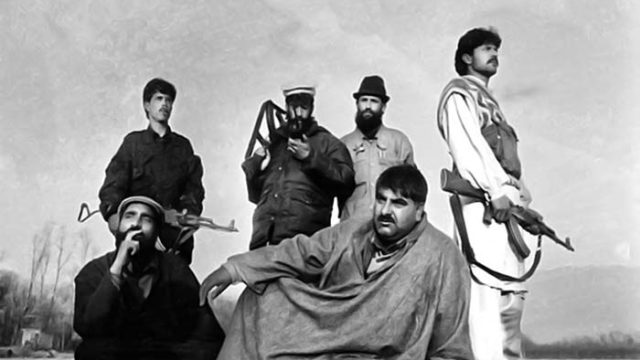After suspected gunmen shot dead Rashid Billa at his Hajin residence, the Ikhwan tales were again in demand. We visited the belt to understand how the cult worked and what the costs were

Kuka Parray’s Ikhwan headquarters in Hajin turned into campaign office for 1996 elections. (Pic: Agencies)
On a chilly February evening in 2017, Shahid, a young boy from Hajin (Bandipora), was waving desperately at incoming vehicles hoping to get a ride home.
“Hajin,” he turned around and asked the man sitting in the back seat. “Yes,” the man replied in a rather authoritative tone, revealing his familiar face. The man was Abdul Rashid Parray aka Rashid Billa. “It was too late to get off the car,” realised Shahid.
As frightened Shahid began weighing his options, the car reached near Hajin army camp, located on the outskirts of the town. Instantly, Billa put on his bullet proof jacket, cocked the AK47 rifle lying next to him and said, “If I will be ever killed, it would be in Hajin only.”
Then without addressing anyone in particular he added, “I feel safe in Srinagar.”
On April 16, 2017, almost two months later, Billa’s prophecy about his death came true when two masked men entered his home in Parray Mohallah, Hajin, and shot him dead. As the news spread in Sonawari belt, one of Kashmir’s most impoverished areas, one man literally heaved a sigh of relief. Introducing himself as Khan, this 50-year-old shopkeeper recalls Billa’s rise within the Ikhwan cult.
In June, 1990, after his father’s death, Billa, a labourer, was appointed as Plantation Watcher in Hajin zone. His appointment was facilitated by his distant relative Mohammad Yousuf Parray aka Kuka Parray, the founder of Ikhwan.
“But Billa never joined his duty as Parray wanted to use him for something big,” said Khan.
However, Kuka Parray, a folk singer turned militant, didn’t reveal his ‘big plan’ immediately. Instead, he focused on building a base for Ikhwan-ul-Muslimeen, one of the hundred militant outfits active in Kashmir then. A few months after his appointment, Billa formally joined Parray as ‘area commander’ of the outfit.
In 1993, on a hot summer afternoon, Ghulam Qadir Dar, then 44, a contractor and truck-driver from Saderkot Bala, was stopped by half-a-dozen militants outside Hajin.
After parking Dar’s truck near the bridge, militants belonging to Parray’s Ikhwan-ul-Muslimeen, took him along. By midnight Dar was shuttled between five hideouts to ensure he remembers nothing.
Finally, as it started getting dark, Dar was handed over to Billa. Dar was accused of working with the army and passing on information about militant movement.

File photo of Kuka Parrey filling his nomination papers from the Sonawari Assembly Segment of North Kashmir on 22 August 1996. (Pic: Agencies)
“I was let go after my family paid Rs 60,000 ransom,” recalls Dar. “It was a huge amount during those days.”
Once home, Dar wanted to forget the episode and move on, but it didn’t happen. “I was asked to visit Parray’s elder brother after one week,” recalls Dar.
When Dar presented himself before Ghulam Ahmad Parray, he was told that his alleged links with army has irked rank and file of Mujahideen. “Then as a way out, he offered me a position as Ikhwan’s commander,” said Dar. “Also, he promised to put 20 gunmen under my command.”
Dar refused politely. But his refusal didn’t go down well with Parray Sr. That day onwards, whenever Parry’s men visited Saderkot Bala to collect ‘funds’ for militants, Dar’s house would get a special knock. “I was always asked to pay ten times more than the rest of the villagers,” recalls Dar. “I would pay without question, knowing they can kill anybody at will.”
Interestingly, in mid-1993, Ikhwan-ul-Muslimeen switched sides and joined hands with the army. It renamed itself as Ikhwan-ul-Muslimoon.
By the time Parray changed his loyalties, he had made sure he has a formidable fighting force. He reached out to militants operating in the adjoining villages to join him. Those who refused were either killed or “banished”. “He kidnapped their fathers, brothers, even mothers and sisters to pressurize militants to surrender and join him,” said Khan.

Abdul Rashid Parray aka Rashid Billa during his heydays as Ikhwan commander.
But not all needed coercion to join Kuka Parray, some of them came voluntarily as they saw opportunity in new Ikhwan. Within days, he created a dreaded force with ‘commanders’ in almost every surrounding village.
While Kuka Parray became Supreme Commander, Rashid Billa took care of Hajin as the base Commander. Billa appointed his deputies almost in all surrounding villages.
“This group helped Kuka Parray control entire Bandipora district,” said Khan. “They all reported to Billa, who in turn reported to Kuka Parray.”
Apart from Billa, Ikhwan’s inner group had Nazir aka Captain; Manzoor Parray aka Wafadaar (Kuka Parry’s cousin) and Ghulam Rasool Parray aka Kaakh (Kuka Parray’s elder brother).
Most important member was Abdul Rehman Parray aka Dilawar, group’s “finance minister”.
Once the group was complete, militant listing started in Bandipora. Billa was assigned to collect data of rich and affluent. Once this process was complete, Kuka Parray decided to formally announce his association with the army.
“He picked up two al Jihad militants and killed them in cold blood in Hajin town in broad daylight,” said Khan. One of them was Abdul Rashid aka Shera.
After that killing, Kuka Parray started executing his plans based on the lists prepared by his ‘commanders’.
Billa was entrusted to implement the first phase. That evening, Rashid Billa led party barged into Abdul Khaliq’s house in Madwan village and dragged him out. He was head of a Jamat-e-Islami run school in Hajin. “They took him to nearby Preng village and shot him dead,” said Khan.
A few days later ‘commander’ Bashir Yar entered another Jamati’s house in Ajas village and killed Ghulam Ahmad Rather.
To keep the fear alive in the hearts of locals, a youngster named Mohammad Yousuf Peer, was dragged through the Hajin streets in broad daylight and then killed. He was from nearby Paribal village. “Nobody could move a muscle when they shot him in full public view,” recalls Khan. Peer was accused of working asHizb-ul-Mujahideen’s over ground worker.

Kuka Parray with his men outside Hajin town during initial days of Ikhwan. (Pic source: Agencies)
These back-to-back killings unnerved almost every militant outfit active in the area. To send a message, one evening, posters of Hizb-ul-Mujahideen appeared in Hajin town warning Ikhwan men of dire consequences. It sent shivers among the locals as everybody feared how Kuka Parray and his gang will react.
The next day, at around noon, Billa paraded four young men from nearby villages through Hajin town.
They were tied with a rope, which was held by an Ikhwani, who dragged them all the way to Billa’s camp. While three of them were let go after their families paid ransom, the fourth one, Mohammad Ashraf Parray, 26, was tortured and killed. “They took him (Ashraf) to a carpet weaver’s house and pressed him inside the loom till his bones crushed,” said Khan. “He died a painful death. I can still hear his screams.”
While nobody dared to criticize Kuka Parray and his men even in their private conversations, there was a labourer named Majid who confronted Billa once. “I still shiver when I remember that day,” said Majid.
After first round of Hizb posters failed to have any impact, another set appeared in Hajin. This time the tone was much straight and warnings more clear: give up bloodshed or face consequences.
Same day four local boys visited Gulmarg for a night of peace and recreation. “One of them was my younger brother,” recalls Majid.
Next day when the boys returned to Hajin, they were picked up by Billa and his men. “They tortured him like animals. They showed a matchstick after sprinkling petrol on his back,” recalls Majid.
When Majid learned about his brother’s ‘arrest’ he ran straight to Billa’s camp and dared him to come out. “I was not thinking straight then,” said Majid. “I was acting purely out of anger.”
The same evening his brother was sent home with a warning for Majid. “Tell your brother we will come for him soon,” they told my brother.
Next evening Billa came to his house with his men as promised. “They said nothing and started firing at my house,” recalls Majid. “It was sheer luck that nobody got hurt.”

Kuka Parray during election campaign in 1996. (Pic source: Agencies)
After firing around two hundred rounds they left, but with one more warning: we will be back again. “Three days later he came back and took my brother along,” said Majid. “It cost me Rs 15000 and number of middle men to get him out safe.”
The ransom money was used to sustain and feed the growing Ikhwan’s appetite. But there were other means of income too. “Kuka Parray’s finance minister Dilawar was a very smart man,” said Khan. “He knew how to arrange money.”
It was on Dilawar’s advice that Kuka Parray feed his ‘masters’ a ‘grand plan’ to clean the region of militants completely.
The plan was to cut down the adjoining jungle, government nursery in Hajin and a huge plantation, to flush out the hiding militants. “He got the entire jungle cleared within a few days,” said Khan. “The actual plan was to sell the timber which he did. It helped him raise crores.”
Once the financial issues were taken care of by Dilawar, the group now wanted to enjoy their lives! “For them the enjoyment always came at helpless people’s expenses,” said Khan.
Within a few days the incidents of eve teasing, molestation and forceful marriages by Kuka Parray’s men peaked.
It all started after an Ikhwani cornered two young girls when they had gone to wash utensils at a stream. “One of the girls probably pushed him away when he tried to touch her inappropriately,” said Khan.
He fled from the spot when a few women raised an alarm, but with a warning. The same evening the Ikhwanibarged into the girl’s house with his men and dragged her out.
“He beat everybody in the house,” recalls Khan. “People could hear her helpless cries all night long. Only Allah knows what he did with that girl.”
A few days later, one of the Billa’s body guards abducted a bride. Same evening, she was forcefully married to her kidnapper. Next morning, Ikhwanis abducted her real husband and tortured him. “He was released after his family paid a ransom of Rs 40,000,” said Khan. “Nobody knows what happened to that boy, some say he committed suicide, but I am not sure.”
By the end of 1995, Kuka Parray’s stature and patronage grew manifolds and he floated his own political party: Jammu Kashmir Awami League (JKAL). He appointed himself as party’s chairman and began preparing for upcoming 1996 assembly elections.
When election came, nobody except National Conference’s Mohammad Akbar Lone, dared to contest against Parray.
“Those were difficult times for everyone living in the area,” recalls Akbar Lone, now a third time lawmaker from Sumbal. Lone recalls how he used to travel stealthily through Sumbul, to avoid confrontation with Parray’s men. “They could have killed anyone at will. They had full backing from the system,” said Lone.
Often, locals used to visit Lone in Srinagar, where he was stationed, with complaints that Parray’s men had taken their vehicles on gun-point, or looted money from them. “It was a routine. I could only request police to intervene, beyond that I too was helpless,” said Lone, who also served as Speaker of State Legislative Assembly.
Days before polling, in a group of threes and fours, Ikhwanis visited all villages in Sonawari belt to seek votes for Parray. One such party, led by Billa was sent to Saderkot Balla and its adjoining villages. “They visited every single house telling people: vote for Kuka Parray or face the music,” recalls Khan. “Even NC’s cadre didn’t dare to oppose his edict.”
But there was one man who not only dared to talk against Kuka Parray and his men, but voted for his opponent. It was Ghulam Qadir Dar, the same truck driver whom Billa had kidnapped as ‘area commander’ ofMujahideen. Dar’s daredevil act enraged rank and file of Ikhwan, who saw it as rebellion!

Ghulam Qadir Dar’s family members protest in Srinagar’s Press Enclave seeking justice for victims of Saderkot Bala massacre.
On October 5, 1996, election results were announced and Kuka Parray was declared winner from Sumbal constituency. Same evening Billa and his men came to Saderkot Bala village looking for Dar.
“I was listening to the radio when I heard one of the Ikhwanis calling my name,” recalls Dar. “He was asking me to come out.”
But Dar’s family didn’t allow him to go out; instead, his son forced him to go upstairs. “There were around 30 men in our courtyard. They had taken position with their weapons pointed towards our front door,” recalls Dar.
When Billa and his men started firing in air Dar’s wife Hajra, 37, ran out to reason with them. “As she reached near the door, they fired at her and she fell down instantly,” said Dar, as if reliving the dreadful scene. Next, Hajra’s daughter Jawa, 18, ran to pick her mother, and she too was shot. Then they shot dead Dar’s elder son Abdul Salam Dar, 21, who went out to help his mother and sister. “Finally they killed my brother’s son Abdul Rashid Dar,” said Dar. “He was inside the corridor. He was just 22.”
Shocked, Dar couldn’t react as he watched four of his family members being killed in a span of two minutes. “He (Rashid Billa) wiped out my entire family in front of my eyes and I could do nothing.”
After Billa and his men left they went to another house in the locality and shot dead Saifudin Dar, 45. “They didn’t stop there,” recalls Dar. Within half-an-hour Billa killed Ghulam Rasool Dar, 35, and Ghulam Nabi Dar, 32, too. “That night was like doomsday for Saderkot Bala village,” said Khan.
Later Dar identified seven of the 30 men including Billa, who killed his family.
“The killings in Saderkot Bala started the doom of Kuka Parray and his reign of terror,” said Khan.
Within 15 days militants killed five of Parray’s close aides in a mine blast in Hajin. “Ikhwan is gone butIkhwanis are still here,” said Lone. “And they are still powerful.”





